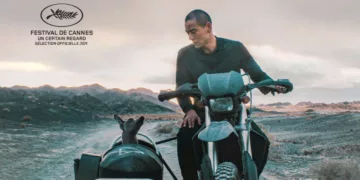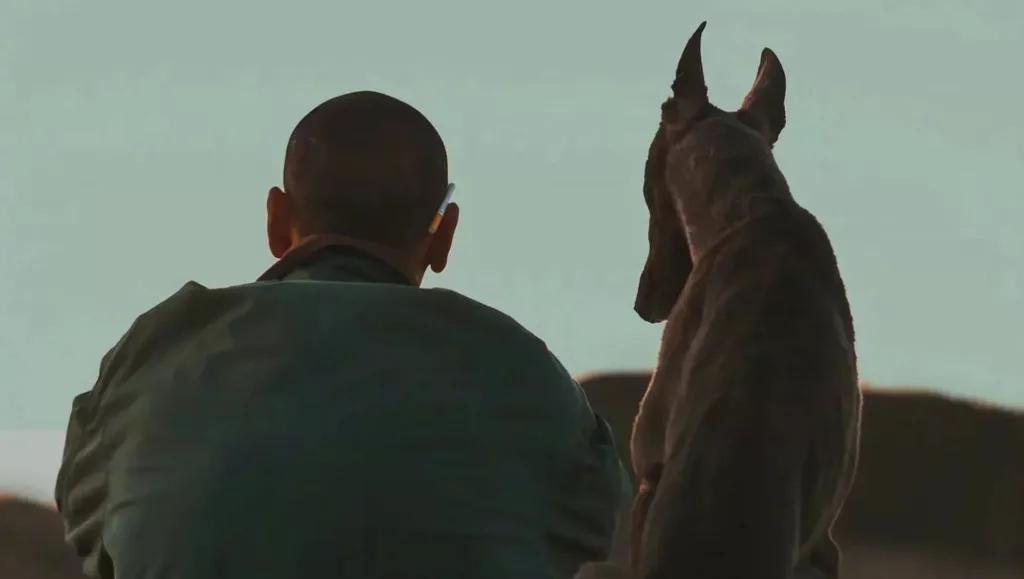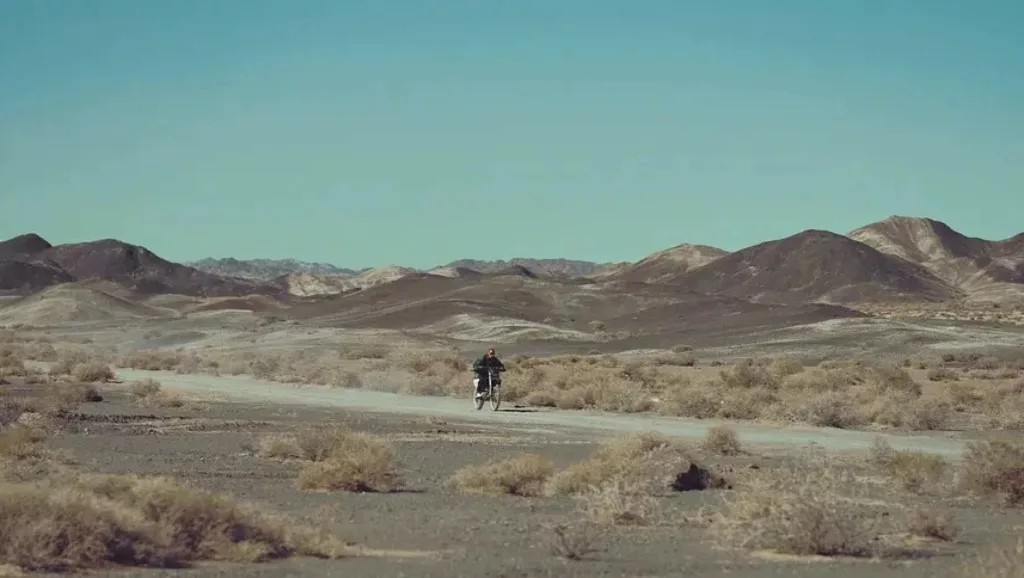The 2008 Chinese drama Black Dog marked a change of direction for its acclaimed director, Guan Hu. Known previously for large-scale epics like The Eight Hundred and The Sacrifice, Black Dog shifted focus to a small-town character study. Set amid the grand but deserted landscapes of China’s northwest, it centers on Lang, a mute ex-convict who returns home to find his community in decay. Like the stray dogs that roam the region, Lang exists as an outcast, with his past haunting him.
His path crosses that of a gangly black dog rumored to have rabies. Their volatile first meeting gives way to an unlikely bond as each recognizes in the other a kindred lost soul. As Lang takes a job capturing stray dogs before Beijing’s upcoming Olympics, the dog remains elusive yet curious. Especially striking is the expressiveness of Eddie Peng’s subtle yet profound performance as the internalized Lang, saying more with gestures and gaze than words.
Guan effortlessly moves between painterly desert vistas and intimate moments between man and dog. As redemptive themes of connection and purpose emerge, so do allegories for modern China—its urban renewal displacing those on the fringes, along with the treatment of stray animals as expendable. Most impactful are simple displays of empathy bridging society’s divisions, offering hope even in a foreboding environment. Through its affectingly muted storytelling, Black Dog reminds us that friendship can be found in life’s unlikeliest of places.
Reconnecting in a Rundown Town
So the movie tells the story of Lang, who just got out of prison and returns to his hometown. Things had changed a lot since he’d been gone. Many buildings were falling apart after years of harsh desert winds battered them. A lot of the town was also going to be torn down to make way for new construction before the big Olympics in Beijing.
When Lang arrives back, he finds his father living in what I can only describe as the most depressing zoo imaginable. It was really just a sad place where the animals were kind of locked up and neglected. It seemed his dad had embraced the doom and gloom, holing up there and drinking his life away. Lang doesn’t really say much to anyone, but you can tell that seeing his father like that was tough on him.
To get by, Lang takes a job helping to capture all the stray dogs that have moved into the town. This is where he first meets the black dog. Their initial meeting doesn’t go so well—let’s just say Lang ends up with a butt wound. But eventually they recognize something familiar about each other. Both are kind of lost souls living on the edges of society.
As Lang keeps at his job, he starts to form a bond with Black Dog, even though the dog has a rumor of having rabies. Maybe Lang sees himself in the way people fear and misunderstand Black Dog. Through their time together, Lang gradually allows his softer side to reemerge. You also see him making small efforts to reconnect with his past.
He tries rebuilding relationships with those who knew him before, like revisiting old areas of town that used to be important to him. Bit by bit, he’s finding his way back from the isolated place his imprisonment left him.
Captivating Canine Cast Carry the Story
The star of this film is definitely Lang, who is played superbly by Eddie Peng. When we first meet him, Lang keeps everything bottled up inside. He doesn’t say much at all after returning home from prison. But Peng uses his body language and facial expressions to show Lang’s turmoil beneath the surface. You really believe this man has walled himself off from the world as a form of self-protection.
Through his bond with the Black Dog, Peng illustrates Lang slowly beginning to open up again. The way he interacts with the pup, you see Lang’s softer side reawakening bit by bit. Even without words, Peng conveys Lang’s growing care and commitment. It’s honestly pretty amazing how he tells such a complex story through gestures and looks alone. No doubt it was a very physically demanding role, but Peng nails it.
Besides the humans, I have to say the canine co-stars deserve major praise. They really carry portions of the plot along believably. A special shoutout must go to the Black Dog for his performance spanning the entire character arc. Starting off, he seems kind of wild and unpredictable. Then showing how he warms to Lang while still having that reckless spirit. By the end, he fully embraces his role as Lang’s loyal companion. I’m telling you, I believed this dog had truly transformed himself.
And that other pup really stole his scene too. The raw emotion he conveyed just by grieving for his owner was incredibly moving. You got to respect all the animal actors for trusting their trainers to help bring this story of unlikely friendship to life. It’s clear that a lot of time and care went into working with the carnal cast. Their wonderful performances are truly what ties everything together in the end.
How Sweeping Visuals Become Another Character in Black Dog
The direction and camerawork really help suck you into this isolated town’s grim world. Guan Hu takes full advantage of the Gobi Desert’s epic landscape for some breathtaking long shots. He sweeps across the terrain, giving you a real sense of its endless, intimidating emptiness.
Yet somehow, the cinematographer, Gai Weizhe, also makes it all feel kind of mystical. Maybe it’s the unique play of light and shadows on the bare rock and hills. Or how the open spaces enhance the feeling of loneliness haunting these characters. But it has an allure that surrounds you like the desert envelops the characters. Beyond creating a moody atmosphere, it truly becomes another character central to the story.
I also have to mention Jia Zhangke’s role; he brings a real sense of gritty authenticity to Uncle Yao. You understand why he’s so respected in the industry. With barely any lines, his tired smile and weary eyes express volumes. Small performances like that add critical layers without drawing attention.
Overall, Guan Hu directs everything with a deft, subtle touch. Even in melancholy moments, he leaves room for hope. Perhaps it’s the lessons he took from Sixth Generation pioneers. But he understands cinema is about more than gorgeous visuals; it’s about how images can profoundly shape our emotions. In Black Dog, his choices perfectly reflect the journey of rediscovery and healing that two lost souls embark on.
Exploring Deeper Meaning in Black Dog
This film manages to touch on some truly profound themes without ever feeling heavy-handed. At its core, it’s about redemption—how Lang and Black Dog rescue each other from lives of loneliness and isolation on society’s edges.
Their relationship also parallels how we all seek belonging and purpose. Through bonding with the pup, Lang starts rebuilding his torn connections. Likewise, Black Dog finds his place at Lang’s side, galvanizing the man’s humanity. Both teach that even outcasts deserve compassion.
Guan Hu draws clear parallels too between the men and their canine co-stars as misunderstood outsiders. In a way, Black Dog becomes a symbol for anyone society casts away. Their growing friendship challenges preconceptions and shows the good in fellows, often judged before being known.
Some also view Black Dog as an allegory for modern China’s rapid changes. The deserted town echoes urban transformation, leaving communities empty. Scenes of pets torn from families likewise parallel traditions dismantled.
Most poignant are the dogs hunted before the Olympics, mirroring real policies and hiding social issues. Through their eyes, Guan Hu seems to quietly question what’s gained by such forced reforms. In the end, Black Dog celebrates humanity over harsh policy in building a just society.
So while Face Value is a touching story of an unlikely bond, this film excavates deeply philosophical layers. With simplicity and subtlety, Guan Hu explores what it means to recover hope and community in disruptive times. Fans of thought-provoking cinema won’t want to miss it.
Reflecting on Black Dog’s Moving Portrayal of the Human Condition
In the end, Black Dog proves a profound character drama given wings by its epic visual style. While following an unlikely friendship between man and man’s best friend, deeper layers emerge. It leaves lingering thoughts on our relationship with nature and society’s outcasts.
The film shows how, even in bleak times, hope and redemption can be found through compassion. By showing stray animals as more than problems to remove, Guan Hu challenges views that dismiss fellow beings. He celebrates the dignity of all life and how we’re shaped by those deemed less than ourselves.
Ultimately, Black Dog sticks with you because of its moving simplicity. Through just a few words or flashes of emotion, it brings the humanity in all of us vividly to light. And in showcasing nature’s beauty even in desolate places, Guan Hu reminds us that wildness still exists wherever communities form.
For those willing to peer below the surface, Black Dog offers much food for thought. But mostly, it spreads its warmth and hopeful spirit with understated grace. In doing so, Guan Hu has cemented his place among cinema’s most salient voices. His flair for visual storytelling and thought-provoking themes make Black Dog a true filmic achievement.
The Review
Black Dog
Black Dog is a quietly moving portrayal of human resilience and our connection to nature. Through sparse dialogue and sweeping vistas, director Guan Hu crafts a profound tale of redemption among society's outcasts. While simple in meaning, the film lingers in one's thoughts through its empathetic lens. For compelling characters and visual storytelling that shine a light on the human condition, Black Dog deserves recognition.
PROS
- Compelling character-driven story of friendship and redemption
- Sweeping landscape cinematography that enhances themes
- Subtle exploration of social and environmental issues
- Introspective yet accessible examination of the human condition
- Strong performances, particularly from Eddie Peng
CONS
- The plot loses some focus in the third act.
- The message could have been strengthened with bolder statements.
- Tone shift in the second half lessens the impact of dystopian settings.
- Certain character arcs feel underdeveloped.


















































